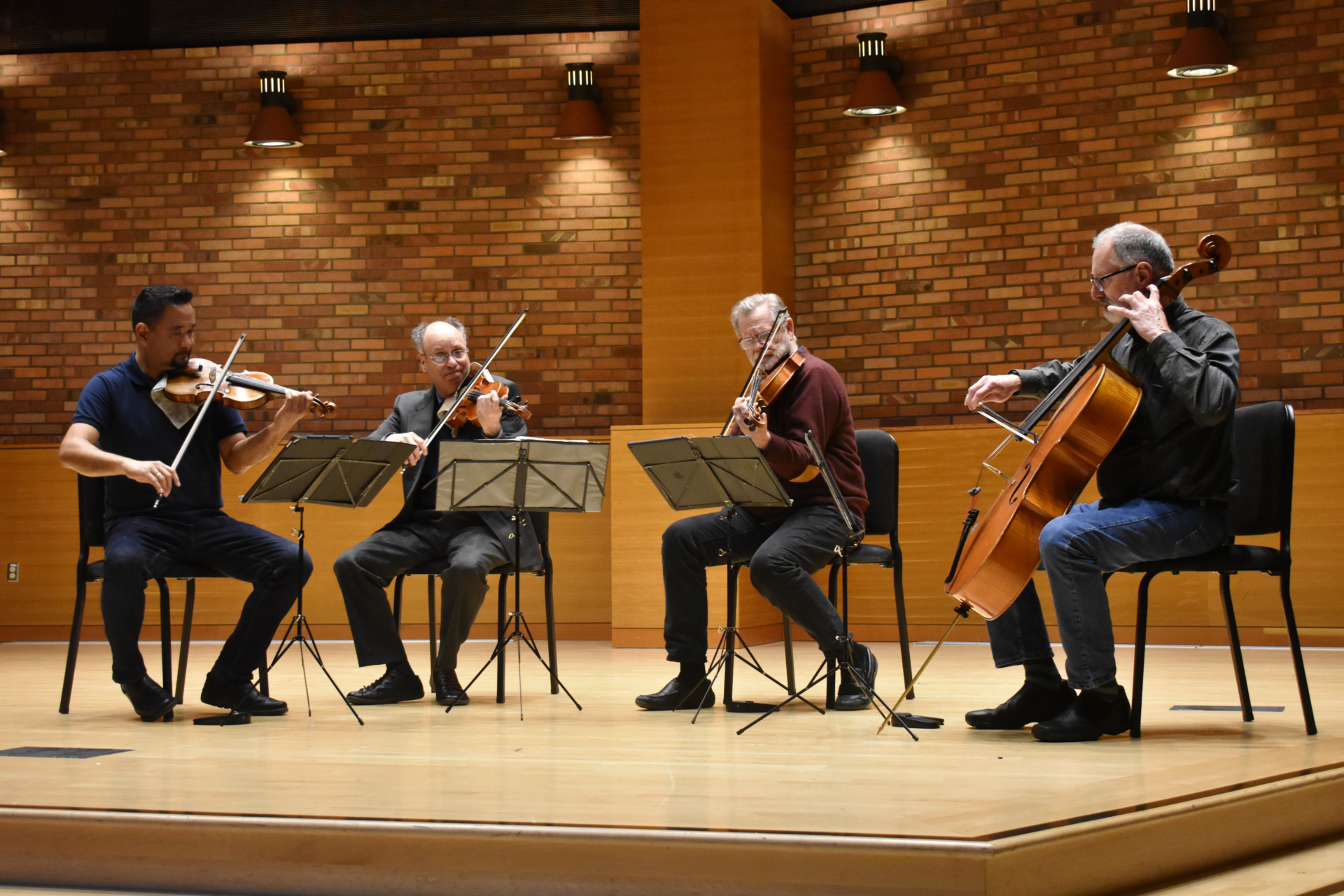
Lewis & Clark invited the Alexander String Quartet (ASQ) to perform at the final Exploration & Discovery (E&D) Colloquium “Sounds Without Borders” on Feb. 12.
The ASQ, comprised of Zakarias Grafilo as first violin, Frederick Lifsitz as second violin, Paul Yarbrough on viola and Sandy Wilson on cello, is a world-renowned group that started in 1981.
The ASQ frequently plays at student events and has visited LC as guests in music classes in the past.
This is the only colloquium, or academic seminar, that has featured live music, which was something Director of E&D and Professor of Music Eleonora Beck felt passionate about including. Next year, E&D will be replaced by Words and Numbers.
“This is E&D’s last hurrah, and so we wanted a party atmosphere,” Beck said. “I wanted to celebrate, and I’m a musician, so what I celebrate most with is music.”
Though the program centered around music, Beck hoped that all first-years got something out of the experience. She encourages students who may not be musically oriented to challenge how they think about music.
“I would like (the students) to understand the hard work that goes into being a professional musician,” Beck said. “I don’t think a lot of students these days get the opportunity to say they want to be an artist, a musician.”
The quartet kept in mind that not all students are involved in music. To supplement the different movements, or isolated parts of a musical piece, the quartet guided the audience with questions to provoke thought. They also provided background information about the composers and pieces played.
Liftsitz said that communicating with students is a vital aspect of their performance.
“We as musicians aim to be accessible to (students),” Liftsitz said. “We want to let them know we’re there as a resource.”
To open the program, the ASQ discussed the theme “Sounds Without Borders,” mentioning that all of the pieces they played were written by composers influenced by cultures other than their own. The group told the crowd they wanted to inspire the younger generation to “make bridges, not walls.” They played movements from four different composers and, due to extra time, played some selections from Mozart.
Leo Bernstein Newman ’23 is in Associate Professor of History Susan Glosser’s E&D, “The Asian American experience” and views the colloquium as an opportunity to challenge himself to think from a different cultural perspective through music. He finds this not only useful for his particular E&D class, but for studying history and modern-day culture in general.
“A lot of modern American history is really about globalization as a result of imperial strength and the waves of immigration that come subsequently,” Bernstein Newman said. “A lot of the music we heard reflected that same historical pattern.”
The ASQ opened with the first movement from French composer Maurice Ravel’s “String Quartet in F Major.” The composer was inspired by Balinese Gamelan music.
Liftsitz said that this was Ravel’s only string quartet and that it marked a historical event as it was played at the opening of the Eiffel Tower in 1887.
“People came from all over the French-speaking imperial world to first experience high quality rhythmic and colorful music,” Liftsitz said.
The second piece was composed by Iranian composer Aftab Darvishi in 2017. “Daughters of Sol” is strongly influenced by Farsi poetry, as well as by musicians like Ravel and others from Holland, where Darvishi has spent a lot of her life. This was the first time the ASQ played this piece.
Darvishi’s piece stuck out to Bernstein Newman, who is a musician himself.
“The way she employed dissonance in the notes … I was trying to understand why there’s so much friction when everything sounded, and everything appeared to be one note,” Bernstein Newman said.
The quartet then moved on to play the second movement from “String Quartet No. 3 in G Major, Op. 94” from English composer Benjamin Britton. This piece has Russian, Hungarian and Bulgarian influences. It was composed a few weeks before Britton died in 1976.
The last planned piece was the fourth movement from Czech composer Antonin Dvorak’s “String Quartet No. 12 in F major, Op. 96.” Dvorak moved to New York with his wife to be part of a conservatory after spending the majority of his life in Prague.
Dvorak was inspired by Native American traditional music and African American spirituals while living in the U.S., both of which were influences on the piece that the ASQ played. The piece is also nicknamed “The American.”
This piece also interested Bernstein Newman.
“It was this really strange, otherworldly blend of Czech classical music, which sounds like itself was heavily folk influenced, and American music of the early 1880s,” Bernstein Newman said. “It’s amazing he was able to capture early Ragtime modalities in the music.”
The performers were impressed by LC students’ engagement with the program.
“LC students are receptive and not afraid to discuss and add on to what we think of as a conversation, rather than a lecture,” Liftsitz said.
This was the desired effect Beck wanted the event to have, calling it her “swan song.” In her eyes, it was a fitting way to close the E&D program in a way that centers around the musical aspect of the liberal arts curriculum.
“This is just a culmination of a lot of hard work and dedication,” Beck said. “I’m very happy about it as we move forward.”
Subscribe to the Mossy Log Newsletter
Stay up to date with the goings-on at Lewis & Clark! Get the top stories or your favorite section delivered to your inbox whenever we release a new issue.

Leave a Reply